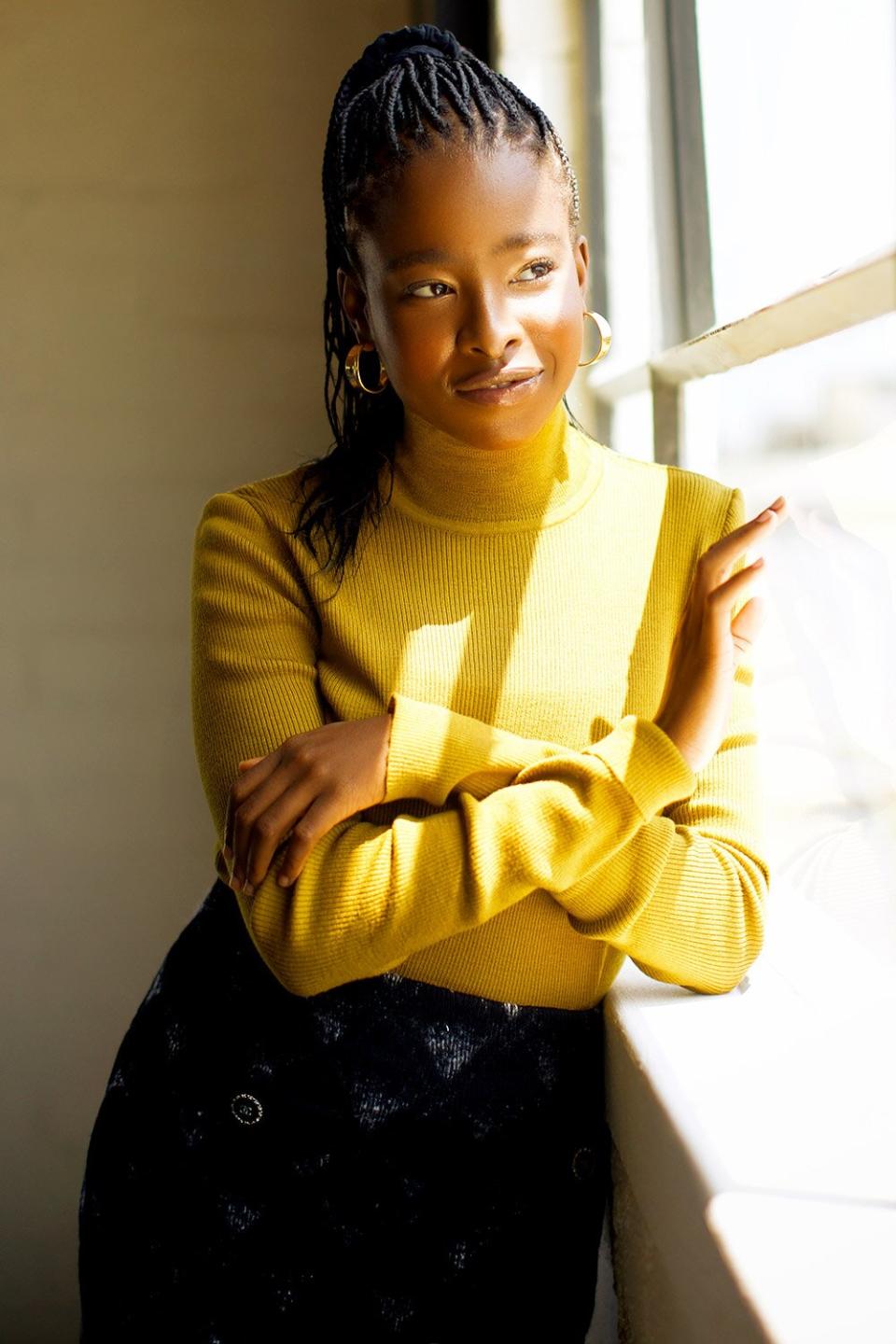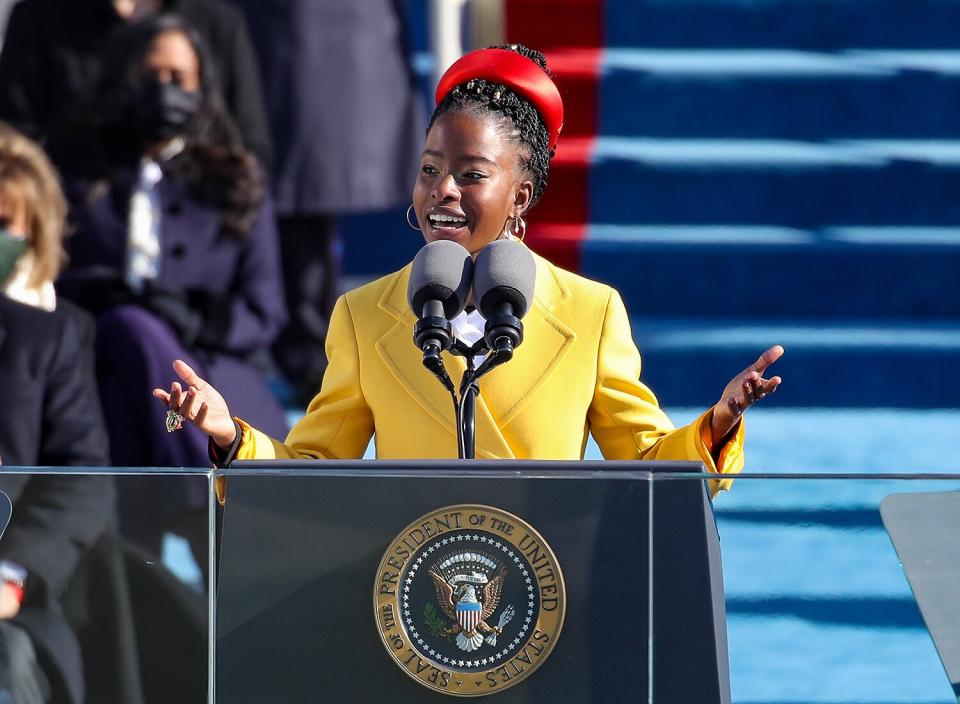Amanda Gorman Talks Simone Biles and New Book: It's 'Powerful' to Claim 'Your Vulnerability'

Danny Williams Amanda Gorman
Poet Amanda Gorman reached a new level of celebrity after she performed at the 2021 presidential inauguration, but her work and the impetus behind her words remain the same.
In an interview featured in this week's issue of PEOPLE, the 23-year-old reflects on life in the spotlight (including meeting Simone Biles) and her new book of poetry Call Us What We Carry, inspired by living in the pandemic.
"When I was writing Call Us What We Carry, I was attempting to preserve the emotional memory of what it means to go through a pandemic," says Gorman, a former National Youth Poet Laureate. "I feel like for so long, all of us were caught in what you might call the fog of war."
Gorman was the breakout star during President Joe Biden's inauguration on Jan. 20, 2021. Her performance of "The Hill We Climb" moved attendees and viewers across the globe. In "The Hill We Climb," now available in book form, she addresses the great divisions in the U.S. across race and class — and hope. ("When day comes, we step out of the shade of flame and unafraid. / The new dawn balloons as we free it," Gorman ends the poem. "For there is always light, if only we're brave enough to see it. / If only we're brave enough to be it.")

Rob Carr/Getty National Youth Poet Laureate Amanda Gorman speaks at the inauguration of U.S. President Joe Biden
The young poet was also lauded for bringing poetry back into mainstream discourse. Gorman tells PEOPLE that poetry in itself is a form of rebellion.
"Poetry is so important because I think it's a unique communication form, which demands us to rebel against older orders," she says. "When I'm writing a poem, I automatically feel the liberty of... breaking grammar, of deconstructing that which I've been told is perfect and pristine and true. And so I think that's often why the language of the people or the populace is poetry."
Keep reading for Gorman's thoughts on her book and what it was like to perform a poem for Biles.
PEOPLE: So tell me about the name, Call Us What We Carry. Why lead with that?
Gorman: When I was writing the book, I was spending a lot of time thinking about the griefs, losses — and also loves and joys — that all of us carry within us. And that those types of emotional reckonings actually might be more accurate ways by which to recognize the best in each other. And so that's why I named it Call Us What We Carry.
PEOPLE: The poem "Compass" really resonated with me. You have this line that says, "The past is one / Passionate déjà vu, / One scene already seen. / In history's form, we find our own faces, / Recognizable but unremembered, / Familiar yet forgotten." So, take me into that stanza and what triggered that for you?

Gorman: I was thinking a lot when I was writing the book about the echoes of the past that have led to this moment. There was so much language around the pandemic being unprecedented, which, in its own way, it is. But, at the same time, I wanted to make sure I was doing my own homework and situating it in its historical context. So, I was looking at the 1918 epidemic. I was looking at issues of health inequality throughout the United States. I was also looking at Red Summer and the racial riots that followed the second wave of the influenza and epidemic in the 20th century. All that is to say, I would've felt like it would be untruthful to write a book about kind of the emotional onus of this moment without, in some way, shape or form, pointing out that all around us we have windows and mirrors — not only into the past but the future that we could become.
For more on Gorman, pick up the latest issue of PEOPLE, on newsstands Friday, or subscribe here.
PEOPLE: How have you been handling your newfound fame?
Gorman: I take it day by day. I don't think there's any crash course on how to navigate a sudden influx of fame. But I'm fortunate that I'm surrounded by an amazing support system and family, both blood and chosen, that keep me grounded. I'm always gratified and humbled by the fact that it's poetry that is making people look at me. That makes any type of scrutiny worth it.
PEOPLE: What's been the biggest pinch-me moment so far?
Gorman: Every single day I wake up and pinch myself. I got to meet Simone Biles recently and recite a poem in honor of her, and that felt like such a special moment for me as a young Black woman. I've admired her for years.
PEOPLE: What did you think of her decision to step back from competition at the Olympics to prioritize her mental health?
Gorman: In my poem I basically said, "Simone has shown that greatness lies not in if we've won, but if we've grown." I think there's something really powerful about claiming your vulnerability as a Black woman and saying, "We have a right to this too."
PEOPLE: What is a day in the life for you when you're not working?
Gorman: I binge The Great British Baking Show. I also love reading biographies. I'll take a walk, spend some time outside, hang out with some friends. It's pretty unexciting and boring, but I need those days.
PEOPLE: What do you hope readers, especially young readers, get from your book?
Gorman: As simple as it sounds, I hope people take hope from the book. Hope, not in a kind of superficial, unsubstantiated way, but hope that is rigorous, that asks questions, that embarks on historical thinking. I think that's the type of optimism that leads to action, and that's why I think it's so important. Honestly, I don't think the youth need words of encouragement from me. They're doing amazing. They're doing great. If anything, I'm just here to take up encouragement from the young people who surround me and are changing the world. So, I'm here for all of it.
Call Us What We Carry is on sale now.

 Yahoo Finance
Yahoo Finance 